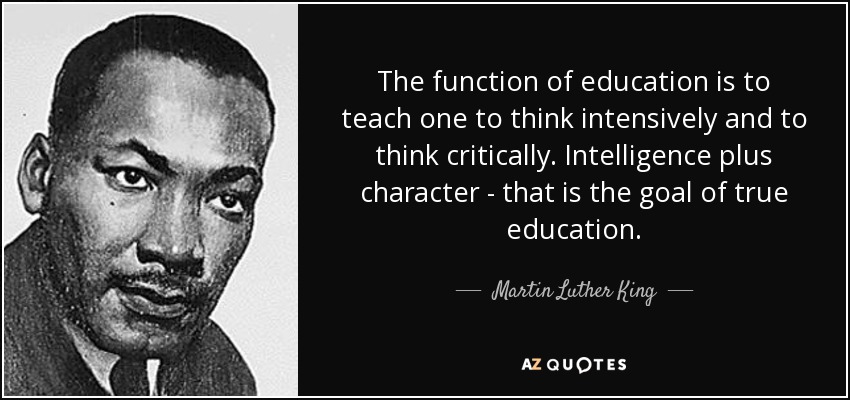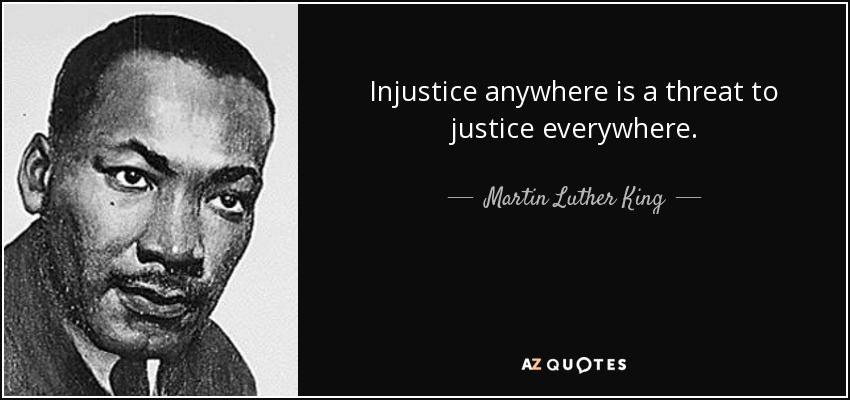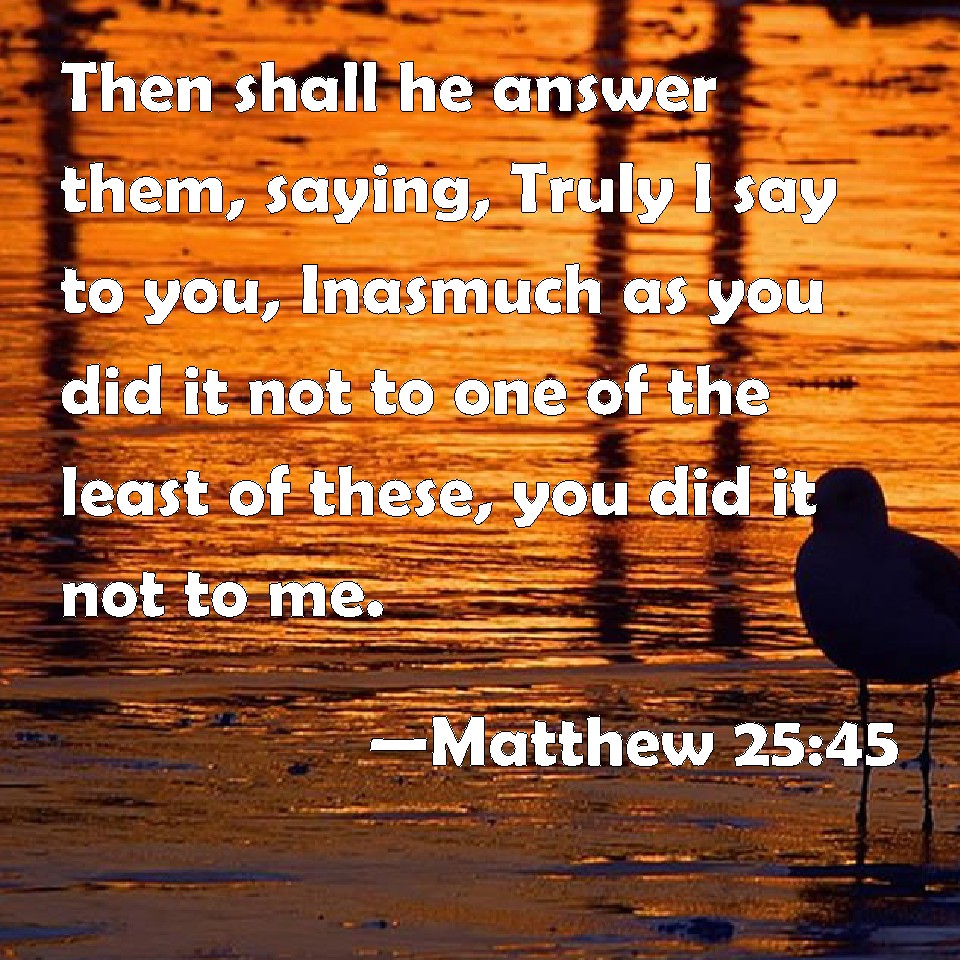Click here to return to Blog Post Intro
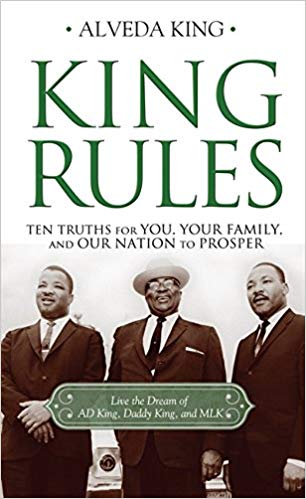
Rule # 1 – Make Home a Priority
Alveda King’s father was brother to Martin Luther King, Junior. In their home growing up, she explained that her grandparents were there with loving discipline and guidance when things got exciting, preparing their sons for leadership and allowing them to develop their individual personalities. A home needs to be a place where all members of the household can express themselves.
This might be one of the most significant lessons about the tradition of home in the King family. Alveda notes that from the time they were very young, they were encouraged to express themselves; and they learned they could talk about anything, as long as they did so respectfully. This is tremendously important, because it develops healthy self-image at an early age and it teaches the value of communication. This pays back big as children get older.
She recalls her mother saying, “You can’t clean house by sweeping the dirt under the rug. Bring it into the light.” She meant you can’t cleanse your soul by hiding your sins. Instead, agape love, repentance, forgiveness, and humility can fix our problems. In this spirit, she made it clear her children could talk with her about anything.
In a loving family, competition is secondary. Fellowship and camaraderie come first.
Every dinner was preceded by one of the children reciting a verse from the Bible, which ensured the family always understood that they first needed to praise God before partaking of His bounty.
What the King family has understood for a long time is that the lines of communication are open wider when you sit down together every night. It is also invaluable for a family to see itself as a unit at least once a day. It serves as a subtle reminder of the strong bonds that unite all of us and how much bigger we are when we are all together.
A home is a palace when every person knows that he or she belongs and is loved. For the King family, a real home has God at the heart of it. God is love, and love abounds in a home where God is honored.
Rule # 2 – Serve Your Family
In the King family, the men have always stood at the head, true patriarchs that take the lead, teach, and live their lives as examples. The Kings were taught that fathers knew best for all.
Women have a significant role as helpers to husbands and co-counsels in the parental equation. While men have always stood at the heads of the King family units, women consistently held intensely vital roles. They were close confidantes of their husbands. They were prayer partners of their husbands. And they had strong and strongly individual voices.
The operating structure that has thrived in the King family for generations revolves around a mother and father both living in the home and both taking active, hands-on roles in all key family decisions. That’s the way it was for Alveda King growing up. The women looking after the children and the men. The men watching over and protecting them. God watching over and caring for all. She was taught the value of sharing prayer in the home from the time she was very little.
In the home, Alveda was taught to honor and obey parental authority, and to also obey proper authority outside the home. This included the school, church, and social environments.
Rule # 3 – Get a Good Education
Beyond instilling in every child a strong foundation of faith (which works by agape love because God is love), there may not be a more important strategy than providing our youth with the kind of education that leads to giving them a real chance to do something meaningful with their lives.
Education is not only important to the King family; it is a critical part of the fabric of the King family. The Kings have always been and will always be steeped in the belief that a vital society is built on the bedrock of good education. Alveda’s uncle (Martin Luther King, Jr.) spoke often and eloquently about this.
The two most important functions of education are developing keen minds and developing strong moral standards.
If we train children well in the paths they should follow in their early days, when they grow up they will not depart from that training.
When children learn early in life that they can be leaders—not followers of the examples of their peers or other humans, but rather following the Word of God—they can be set free from harmful peer pressure.
We are losing far too many of our young people to jail. There are two primary reasons for this. One is the lack of the kind of strong family structure. The other is the failure of many schools to serve as a place where great character is both modeled and emphasized. What is most important is that some form of values education be in place in all of our public schools, even those that choose to keep religion completely out of their curriculum.
We need to stop—as Martin Luther King, Jr. put it so eloquently—“pauperizing education.” We provide our schools with the trappings of paupers, we pay our teachers barely better than paupers, and we somehow expect them to turn out a generation of princes. It just doesn’t make sense, and we need to do better.
Rule # 4 – Guard Your Heart
As a child, Alveda watched her father come home and seek refuge from his difficult days in her mother’s arms. The two of them would kneel and pray together, finding enormous strength in their shared connection with God. Many years after he died, Alveda’s mother told her that praying together reminded them on a daily basis just how special and blessed their relationship was.
Like her mother and father, Alveda’s aunt and uncle always prayed together, and they point to this as a key to the longevity of their union.
Research has shown that people who are in monogamous Christian marriages live longer.
The King family has always held the Bible as the highest standard for human conduct. Therefore, they always understood that, beginning with themselves, all human beings are imperfect, in need of liberty from sin, sickness, disease, and social ills. Agape love and forgiveness have always been the answer.

Rule # 5 – Defend Life
In 1966, Planned Parenthood presented Martin Luther King, Jr. with the Margaret Sanger Award, named in honor of “the woman who founded America’s family planning movement.”
He was wary about receiving the award from the moment he heard about it. Unfortunately, that didn’t stop Planned Parenthood from trading on his name to this very day.
One of Martin Luther King, Junior’s most oft-quoted proclamations comes from his 1958 book, Stride Toward Freedom: “The Negro cannot win . . . if he is willing to sell the future of his children for his personal and immediate comfort and safety.”
In his “Letter from Birmingham Jail,” he underscored this sentiment by speaking out against “such ancient evils as infanticide,” yet another clear indication that he never would have come out in favor of the institutionalized killing of unborn children.
Martin Luther King, Junior never believed in the platform of Planned Parenthood. He did not even go to receive the award.
The baby inside a pregnant woman is not her body. That baby is a distinct human being who should have all the rights that we convey on people outside of the womb. The woman carrying that baby should have no more right to kill that child than she would have once the baby is born. Abortion is not a civil right. It is the abrogation of the civil rights of an innocent and entirely defenseless human being. In the debate over abortion, the foremost civil right is the child’s.
Such values require each of us to take an active role in creating a culture of life.
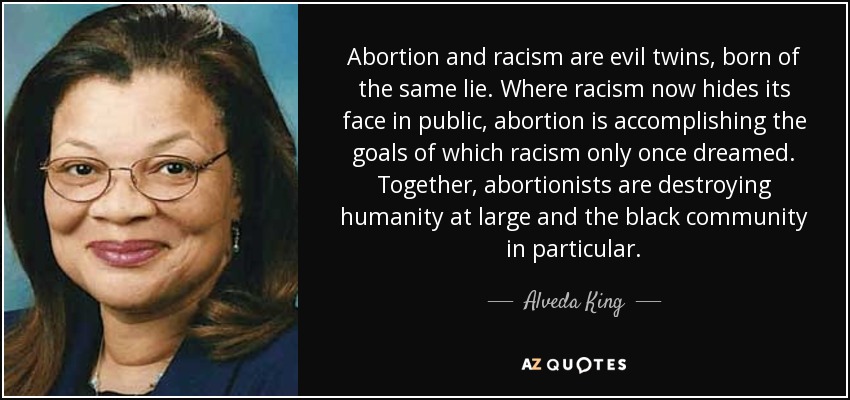
Rule # 6 – Fight for Justice
Martin Luther King, Jr. once proclaimed, “We will not be satisfied until justice rolls down like waters and righteousness like a mighty stream.” It’s a quote from the prophet Amos.
For all that we have accomplished, there is still far too much oppression in America, far too many people whose opportunities are painfully limited, far too many circumstances in which those who aspire to contribute more to the world succumb to the devastation and degradations of the day-to-day. And as Martin Luther King, Jr. wrote in his “Letter from a Birmingham Jail”:
Alveda’s father encouraged her to discover what she would enjoy doing in life and then prepare to be good at it, through school and positive life experiences, so she would enjoy working and creating opportunities for success. She followed that advice all of her life.
When we stand as a community, when we make sure that we help everyone to help themselves, when we never forget where we came from and how much we owe our forebears, we cannot be held down arbitrarily. “Nobody can ride your back,” said Daddy King, “unless you bend over and let him climb on.”
Jesus Christ assumes that we’ll be helping those in need. “When you give to the needy,” he says, not “if.” A community governed by faith is moved to charity. We are supposed to offer of ourselves and not make a show of it. We are also supposed to trust that God will provide our needs.
If they were alive today Alveda’s father, grandfather (Daddy King) and uncle (Martin)—all pictured on the cover of the book—would all be rallying inner city businesspeople to be active, contributing, and continuing members of their communities. Rather than welfare, what we need is an incentive program, gradated over a period of five years, to help families stand on their feet again. First, we need to change the system so it doesn’t penalize intact families. Right now, it is far more profitable for welfare recipients to be single parents, and that is eroding the fabric of our society. Next, we need to set up a system in which we subsidize people while they are learning a trade or a profession. This accomplishes two enormously important things: it offers opportunity and it demands responsibility.
Perhaps the biggest roadblock we face in the effort to achieve justice is complacency. It is all too easy to convince ourselves that we have made sufficient progress, that our land is a more tolerant one, that people have greater access to opportunity than before.
The poverty rate has indeed dropped fairly substantially since the late fifties. Still, the job is far from finished. Forty-six million people living below the poverty line is far, far too many.
If we truly want the justice the King family always fought for, then we can never be satisfied that things are marginally better. We must always keep up the fight to do as much as we can to give everyone a fair shot at having a good life.
Rule # 7 – Care for the Needy
As guardian of the King family legacy, Alveda has grown to realize there is a certain credo established in her bloodline, requiring her to serve God and the human family with a depth of spiritual commitment accompanied by the tenets of servant leadership and a commitment to upholding ancestral and tribal family values, which are founded in faith in God and His agape love.
During his 1964 Nobel lecture, Martin Luther King, Jr. said, “I have the audacity to believe that peoples everywhere can have three meals a day for their bodies, education and culture for their minds, and dignity, equality, and freedom for their spirits.”
Jesus told us the poor will always be with us, but He also told us that it would be unkind and simply wrong to ignore their needs. He implored us to care for the poor and hungry if we truly want to serve Him.
You know the saying, “Give a man a fish, you feed him for a day. Teach him how to fish, and you feed him for a lifetime”? It’s certainly true. Alveda explains, “In my lifetime I have seen this truth applied to my life and to the lives of many others. In the King family, with the grace and guidance of God, and with the love of Jesus in our hearts, we help people to fish: to fish for creativity, for purpose, for inspiration to accomplish their goals.”
Rule # 8 – Work for Peace
Perhaps the word most closely associated with the King name is peace. The King family has a long history of leading the charge against injustice and intolerance, but they have always done it through peaceful means. It is one of the family’s fundamental beliefs that great and lasting change can only come when accomplished with peace in view, and they have lived that value for generation after generation.
In Martin Luther King, Jr.’s first book, Stride Toward Freedom, he presented the Six Principles of Nonviolence, which are indeed footprints on the path to peace. This template is every bit as valid today as it was then.
- Nonviolence requires courage. It is not passive. One way people misunderstand nonviolence is confusing it with being meek or sheepish. Not so! Choosing to deal with conflict or to address social change without resorting to violence requires tremendous strength and courage
- Nonviolence seeks reconciliation. The goal isn’t to wipe your adversary off the face of the earth, but to find a way to seek common ground, to live harmoniously, and to create a better situation for yourself that your opponents can accept. Proverbs 15:1 says, “A soft answer turns away wrath, but a harsh word stirs up anger.”
- Nonviolent action is directed at eliminating evil. It is not about destroying an evildoer. When the King family fought so hard for civil rights, the agenda wasn’t to punish those who had unjustly limited the rights and freedoms of African Americans. Rather it was to effect the kind of change that invalidated this sort of treatment. When we worship God, continue to walk in love, and refuse to argue and enter into strife, we win. The Bible says we “overcome evil with good” (Romans 12:21). Evil is dispelled by love and kindness.
- Nonviolence means accepting suffering for the cause. However, never inflict suffering on others. Making a commitment to nonviolence is likely to subject you to multiple instances of pain and suffering. This is why it takes so much courage to maintain the position. It is also why it is so effective, especially when attempting to sway public opinion. Ultimately, your adversary is exposed as being morally bankrupt, and the purity of your position becomes clear. This accomplishes overwhelmingly more than violence can accomplish.
- Nonviolence involves a refusal to commit physical violence. It is a rejection of hatred, animosity, and violence of the spirit. Real peace is impossible if you harbor hatred in your soul. Hatred festers. Hatred leads to violence, so you must teach yourself not to hate. The truth is we must learn to be fearless in our pursuit of love, justice, and righteousness. As Amos 5:24 teaches, “[L]et justice roll down like waters, and righteousness like an ever-flowing stream.”
- Nonviolence is committed to the belief that good will win out in the end. It is faith that justice will prevail.
Many people want to see much stronger gun control laws. These people might have the right intentions, but life has taught Alveda that anger and hate are not constrained by taking away a weapon. The civil rights era proved that baseball bats, lead pipes, and ropes are lethal when in the hands of evil men. Terrorists have proven that fertilizer, nails, and airplanes kill more effectively than guns. The weapon is not the problem. The problem is inside the human being who wants to kill.
We will not end violence by trying to take away guns. We will not end violence by trying to demonize guns. We will not end violence because human beings are selfish, unloving, fearful, fallen creatures who will find ways to strike out against others. The problem is us. The answer is Him.
If our leaders really want to create a society where gun violence—and, for that matter, knife violence, bomb violence, and every other kind of violence—is reduced, if not eliminated, they will stop trying to remove God from every sphere of public influence.
The Martin Luther King Jr. Center for Nonviolent Social Change—better known as the King Center—was founded by Coretta King in 1968 to serve as both a monument to Martin Luther King, Jr. and to educate about his life and inspire with his message. The King Center has developed the following six-step sequential process of nonviolent conflict resolution—an effective approach to achieving peace:
- Get the facts straight. Use information gathering and research. So often conflict emerges because people on one side fail to understand the objectives and motivations of the other side.
- Educate adversaries and the public about the facts of the dispute. It is often possible to make inroads and to allow the less fanatic among your adversaries to begin to see the other side of the story, and this can have a dramatically positive effect.
- Maintain a personal commitment to nonviolent attitudes and action. There is no better way to lead than by example.
- Negotiate with adversaries in a spirit of goodwill to correct injustice. A negotiation in goodwill is one devoid of hatred for one’s adversary.
- Use nonviolent direct action. Methods include marches, boycotts, mass demonstrations, picketing, sit-ins, and so on, to help persuade or compel adversaries to work toward dispute resolution. These forms of protest are extremely effective for two important reasons: (1) they raise mass awareness of a problem, and (2) no one gets hurt. Riots and other violent actions might grab headlines, but they rarely generate the kind of sympathy that leads to social change, because the protesters too often come across as criminals.
- Seek win-win outcomes. Reconciliation of adversaries in a win-win outcome establishes a sense of community. It’s important to remember that just as violence is rarely a useful tool, shaming and humiliating your adversary is rarely effective in the long run. Lasting peace in any situation is forged on compromise.
It’s often said that society can’t legislate morals, and that hearts can only be changed through a combination of education and religion. That’s only partly true. While morality itself cannot be legislated, behavior can be. It may be true that the law cannot change the heart, but it can certainly restrain the heartless. Martin Luther King, Jr. reached that conclusion fifty years ago and spoke about it during an address at Western Michigan University. “It may be true that the law cannot make a man love me but it can keep him from lynching me, and I think that is pretty important, also.”
Rule # 9 – Build the Beloved Community
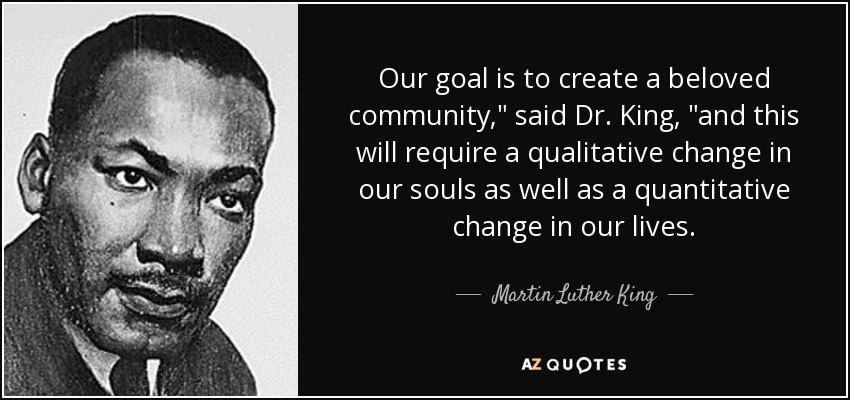
The King family legacy is inextricably linked to the subject of race. There’s a certain amount of irony that a family which has fought so hard to fulfill Martin Luther King Junior’s dream could be forever connected to the problem of people judging others by the color of their skin, rather than the content of their character. There’s a further irony here in that for generations the King family has maintained the belief that, while the people of the world may come from a variety of ethnicities, they all come from one race—the human race.
Martin Luther King, Junior spoke of his vision for a “Beloved Community,” one where “brotherhood is a reality.” In a 1957 pamphlet outlining the mission of the newly formed Southern Christian Leadership Conference, he declared the “ultimate goal is genuine intergroup and interpersonal living—integration.”
According to Acts 17:26, God “made also of one blood every nation of men, to dwell upon all the face of the earth—having ordained times before appointed, and the bounds of their dwellings.” The message in the Bible is unmistakable: we all come from the same original ancestors. At the most fundamental level, we all share the same blood. We are all built the same way; we all feel love and joy and pain and desire for community.
There are differences, but there is one overriding commonality, one great unifier. In his 1967 Christmas Eve sermon, Martin Luther King, Jr. preached, “Man is a child of God made in His image, and therefore must be respected as such . . . [W]hen we truly believe in the sacredness of human personality, we won’t exploit people, we won’t trample over people with the iron feet of oppression, we won’t kill anybody.”
At the time of this book, President Barack Obama just completed his second presidential inauguration. Still, as much as we’ve accomplished, Martin Luther King, Jr.’s vision of a Beloved Community remains in many ways unfulfilled. The Beloved Community calls for us to fight against poverty, discrimination, and violence in every form. And as human history unfolds, the forms that discrimination and violence take will evolve and change. Yet our commitment to overcome them must not change, and we must not shrink from the work of justice, no matter how unpopular it may become or how satisfied some people might be with how far we’ve come.
Martin Luther King, Junior once said, “We must all learn to live together as brothers (Alveda added “and sisters”), or we will all perish together as fools.”
Rule # 10 – Find Your Joy
Opinions vary on the nature of happiness, and one person’s sugar is another’s poison. “Justice is a joy to the godly,” said Solomon, “but it terrifies evildoers” (Proverbs 21:15).
Every human being has a right that goes much deeper than the mere pursuit of happiness. On life’s journey we should add to our pursuits the promise that comes with everlasting joy. Psalm 30:5 tells us that “weeping may endure for a night, but joy comes in the morning.”
Happiness is a mercurial, fleeting expression subject to change with the shifting tides and the setting sun. But that’s not true of joy. Joy is a deeper, more lasting experience subject to remain even as the tears flow and the cold winds blow.
The fountain of joy is much deeper than the well of happiness. Joy comes from understanding that you are truly blessed and your blessings are not ephemeral things. Happiness comes and goes, but when you find joy—rich, abiding joy—it lasts for a very, very long time; joy can last forever.
Alveda explains, “Overwhelmingly, though, the most joyful experience in my life came in 1983 when I accepted Jesus Christ as my personal Lord and Savior. This acceptance left me with the most intense sense of stability I have ever known. It began not to matter to me what was happening in the world around me because the joy of the Lord became my strength. From that day forward joy has been a constant companion. I have come to realize that my greatest joy comes from God and from the peace I find in obeying God. That joy is truly irreplaceable, and I wish this joy for everyone.”
May you experience the same joy Alveda expresses and apply these 10 truths to help you prosper, as you shoot for the stars.

